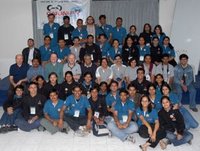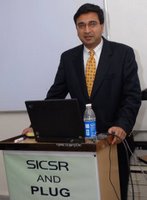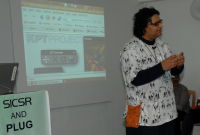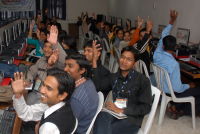 BlogHer 2008, is an annual conference that brings together bloggers from all over the world to confab under one roof. This year it will be held July 18-20 in San Francisco. Over 1000 women bloggers will gather together at this forum to talk and blog live about a lot of topics – from political opinion commentary to parenting, green eco-consciousness to travel, good blogging techniques to open source technology and blogging tools. Pretty cool, huh!
BlogHer 2008, is an annual conference that brings together bloggers from all over the world to confab under one roof. This year it will be held July 18-20 in San Francisco. Over 1000 women bloggers will gather together at this forum to talk and blog live about a lot of topics – from political opinion commentary to parenting, green eco-consciousness to travel, good blogging techniques to open source technology and blogging tools. Pretty cool, huh!
I’ll be one of the speakers at an exciting panel this Friday on “Why Bloggers (Even Non-Programmers) Benefit from Participating in Open Source Projects“. My fellow panelists include Mozilla’s Chief Lizard Wrangler Mitchell Baker and Freebase community director Kirrily Robert. This panel will discuss why and how bloggers, programmers and even non-programmers can participate in open source projects and the benefits of participating in the open source community which shares a lot with the blogging world. Participation begins with an itch to scratch or a problem to solve and can be challenging as well as fun in open source projects . This interactive discussion promises to be interesting and I’ll blog more on my experience later.
 Keep your data free. Free from vendor lock-in. Support Document Freedom Day on March 26. Activities and events will be held around the world to promote awareness of free document formats such as ODF.
Keep your data free. Free from vendor lock-in. Support Document Freedom Day on March 26. Activities and events will be held around the world to promote awareness of free document formats such as ODF.
 Harshad and his organizing team did a phenomenal job of covering an excellent range of topics in the conference program – from Mozilla Prism, Ruby on Rails, PHP, MySQL, Erlang, Django to visual design tips, network management and security. Every room was packed with spillover seating on the speaker dais. BOFs on
Harshad and his organizing team did a phenomenal job of covering an excellent range of topics in the conference program – from Mozilla Prism, Ruby on Rails, PHP, MySQL, Erlang, Django to visual design tips, network management and security. Every room was packed with spillover seating on the speaker dais. BOFs on  There were a lot of talks I wanted to attend but could only manage to squeeze into
There were a lot of talks I wanted to attend but could only manage to squeeze into  I ended up helping out for the Ruby on Rails workshop by
I ended up helping out for the Ruby on Rails workshop by